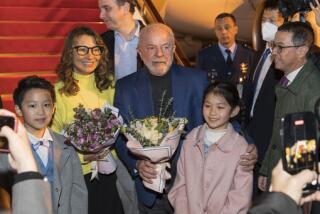ELECTIONS : Brazil’s Soccer Mania Forces Fancy Footwork on Candidates : Presidential front-runner leaves the country to campaign.
- Share via
RIO DE JANEIRO — For nearly four years, presidential candidate Luis Inacio Lula da Silva has crisscrossed this country in pursuit of the prize that narrowly eluded him in 1989.
Lula, a union leader and political outsider with a sixth-grade education, has struggled to woo gold miners, farmers and rubber tappers in tiny backwater towns, factory workers in the country’s huge urban centers, and intellectuals, professionals and left-wing millionaires in its coastal cities.
Now, less than four months from the Oct. 3 election, as Lula leads in the polls and appears on the threshold of becoming head of the world’s fifth most populous country and eighth-largest economy, he has all but abandoned his efforts at campaigning on the homefront.
He has flown off to South Africa, because while Lula may be able to handle his six political rivals, he can’t compete with 11 other men, dressed in yellow shirts and green shorts, kicking a white and black ball around a big grass field in California.
Brazil is competing in soccer’s World Cup, and nothing is more important than that for the 155 million people of this country where schools close, factories shut down and government workers are let off early for each game Brazil plays. When Brazil played its first game on Monday, only 77 of Congress’ 584 representatives showed up for the daily session, and they spent the day making speeches urging the team to victory.
“A presidential election should be more important than a sports championship, but here it’s not,” said Richard Foster, editor of Brazil Watch, a newsletter that publishes economic and political analyses.
Consequently, as the presidential campaign heads into its final stretch, anxious candidates are scrambling to keep their message in front of voters whose attention will be focused thousands of miles away until Brazil is eliminated from the championship contest or the games end July 17.
How those in the running do that is being watched carefully by political analysts and campaign strategists, because the candidates’ efforts in coming weeks will have implications far beyond the immediate campaign. Due to a constitutional change this year, every presidential election and the elections of hundreds of other officials--the entire Chamber of Deputies, a major portion of the Senate and all 27 governors and state assemblies--will, by happenstance, coincide with the quadrennial World Cup.
*
Instead of trying to compete with soccer, the candidates plan to go full bore in August when they begin receiving required free television time. Until then, they are searching for soccer tie-ins.
They mug for the cameras while bouncing soccer balls off their knees and heads. In interviews, they recite detailed analyses of Brazil’s team, tout their childhood soccer experiences and offer advice to the coach.
Campaign rhetoric is overlaid with soccer metaphors, something analysts predict will intensify with each Brazilian victory.
“I’m going to have a government just like this team,” said candidate Fernando Henrique Cardoso, the country’s former finance minister and Lula’s strongest challenger, right after Brazil swept past Russia in its first game.
Esperidiao Amin, a right-wing candidate seeking to bolster a flagging campaign, claimed, “I am the Romario (de Souza Faria) of the elections,” referring to the Brazilian team’s star player.
It is too early to tell how the politicians’ efforts are playing with the electorate. Ironically, Lula, whose next stops are in Germany, may have picked the best strategy of all. Photographs and reports of his meeting with South African President Nelson Mandela made the front pages of the major newspapers and led news broadcasts.
“It’s a major coup for us,” said one Lula official. “We determined the only way to deal with the Cup was not to be here during the Cup.”
More to Read
Sign up for Essential California
The most important California stories and recommendations in your inbox every morning.
You may occasionally receive promotional content from the Los Angeles Times.










